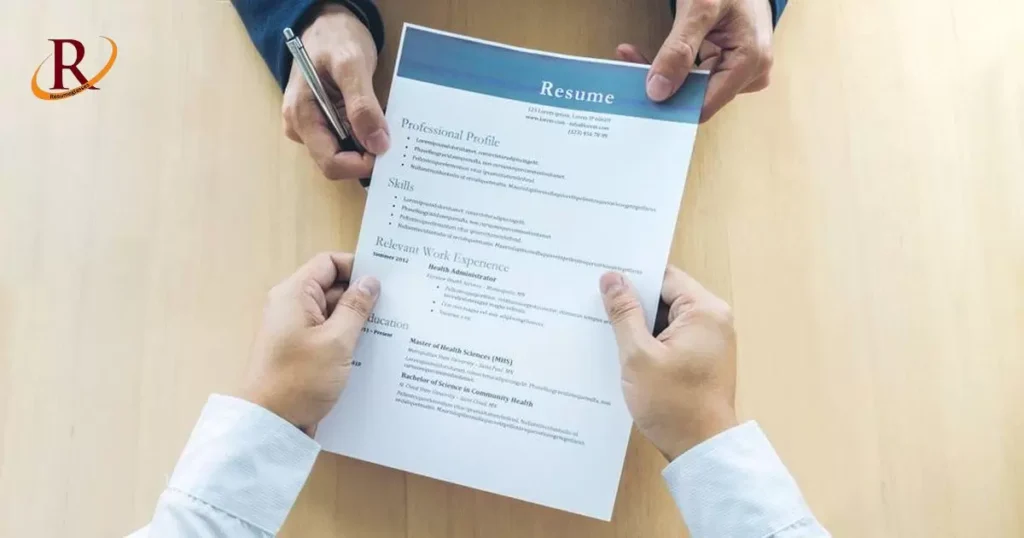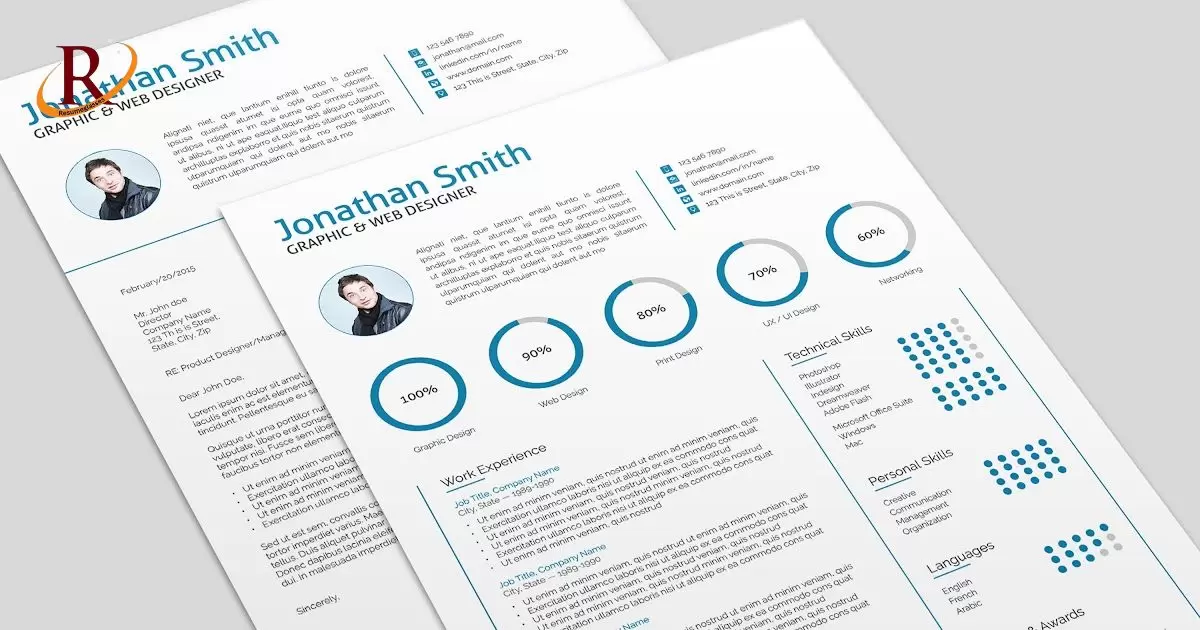End resume means the last part of your resume, where you finish telling about yourself to get a job. This part is crucial because it’s the final thing employers read about you. Making it suitable is essential to leave a solid and lasting impression on the people who might hire you.
The end of your resume isn’t just a routine part. It’s about making a solid last impression. Here is one question that arises: How to end a resume? Let’s learn the tricks of creating a powerful ending that concludes your resume and gets employers excited about you. Learning how to wrap up your resume can be the secret to opening doors to exciting job possibilities.
Ending your resume effectively is about leaving a positive impression on potential employers. Consider crafting a closing statement that briefly summarizes your skills and experiences. You might also express enthusiasm for discussing your qualifications further in an interview. The conclusion is your final chance to make you stand out in the competitive job market. Mastering the art of concluding your resume can greatly enhance your chances of securing that desired job.
How to End a Resume Effectively
| Technique | Description |
| Powerful Summary | Craft a succinct, impactful summary that highlights key achievements and leaves a lasting impression. |
| Call to Action | End your resume with a compelling call to action, encouraging the hiring manager to take the next step. |
| Personalized Sign-off | Conclude with a personalized sign-off that reflects your personality and professionalism. |
| Tailored Closing Line | Develop a closing line that directly aligns with the job requirements and company culture. |
| Relevant Contact Info | Ensure your contact information is prominently displayed for easy accessibility. |
| Proofread and Edit | Review your conclusion for grammar and spelling errors to maintain a polished and professional image. |
Implementing these techniques can significantly enhance the effectiveness of your resume’s conclusion, increasing your chances of leaving a positive impression on potential employers.
What Can You Add to Make It Memorable?
- Striking Opening Statement: Begin with a memorable and attention-grabbing introduction to captivate the reader.
- Showcase Achievements: Highlight specific accomplishments and successes to leave a lasting impression on the reader.
- Incorporate Quantifiable Metrics: Use numbers and percentages to quantify achievements, providing concrete evidence of your impact.
- Tailor to the Job: Customize your resume to match the job requirements, emphasizing skills and experiences relevant to the position.
- Unique Skills Section: Include a standout skills section that showcases a mix of technical and soft skills, making your resume memorable.
- Use Power Words: Employ strong action verbs and descriptive words to convey energy and enthusiasm, making your contributions stand out.
- Personal Touch: Add a brief personal touch or hobby section to humanize your resume and create a memorable connection.
How to End a Resume Professionally and Visually Appealing

As you approach the conclusion of your resume, it’s essential to wrap it up with a professional and visually appealing touch. Maintain a clean and organized layout, using an appropriate and easily readable font to ensure a polished presentation.
Consistency in formatting, including font style and spacing, contributes to a cohesive look. Use bullet points strategically to highlight key achievements and skills, enhancing clarity and visual engagement. Embrace white space to prevent visual clutter and improve readability. While maintaining professionalism, consider adding subtle design elements or unique formatting touches to make your resume visually distinctive.
Before finalizing, proofread thoroughly to eliminate errors and ensure a flawless presentation. This meticulous approach to concluding your resume conveys professionalism and creates a visually appealing document that leaves a positive and memorable impression on potential employers.
How to End a Resume with Strategic Industry Terms

Concluding your resume with strategic industry terms is a savvy approach to underscore your expertise and align your qualifications with specific job requirements. By integrating key industry buzzwords throughout your conclusion, you demonstrate fluency in professional jargon and increase your resume’s visibility in applicant tracking systems.
Tailoring your language to the specific job and industry reflects a nuanced understanding of your field and captures the attention of hiring managers seeking candidates with a firm industry grasp. Additionally, emphasizing technical skills, quantifying achievements with industry-specific metrics, and showcasing relevant certifications and memberships enhance your credibility and reinforce your professional standing within the industry.
Striking the right balance between clarity and industry language ensures that your resume stands out and resonates with potential employers, making a compelling case for your candidacy.
How to End a Resume for Maximum Reader Engagement
- Compelling Summary: Craft a brief but compelling summary that encapsulates your key qualifications and strengths.
- Strategic Call to Action: Include a subtle call to action expressing your interest and openness for further discussion.
- Relevance to Job: Ensure your conclusion directly aligns with the specific job requirements, emphasizing your suitability for the role.
- Showcase Achievements: Highlight significant achievements, quantifying them when possible for added impact.
- Tailored Language: Use industry-specific language and tailor your words to resonate with the company’s culture and expectations.
- Visual Appeal: Maintain a visually appealing format with strategic use of bullet points and white space for readability.
- Enthusiastic Closure: Conclude with a professional closing and express enthusiasm for the opportunity.
How to End a Resume with Impactful Achievements
Conclude your resume on a solid note by emphasizing impactful achievements. Add a dedicated section to showcase critical accomplishments towards the end of your resume. Frame these achievements using concise and powerful language, illustrating how to end a resume with a dynamic summary of your contributions.
Begin each achievement with action verbs to convey a sense of proactivity and success. Quantify your accomplishments whenever possible, using numbers or percentages to provide tangible evidence. Prioritize and organize achievements based on significance, prominently placing the most impactful ones. Tailor your accomplishments to align with the specific job requirements, demonstrating how your past successes make you an ideal candidate.
Ending your resume by focusing on impactful achievements reinforces your value proposition, leaving a compelling and positive impression on potential employers. Consider presenting this information on a double-sided resume for an even more comprehensive overview of your qualifications.
Resume template ending with Achievements
[Your Name]
[Your Address]
[Your Email Address]
[Your Phone Number]
Objective:
[Clear and concise statement about your career goals and what you bring to the table]
Professional Experience:
[Job Title1]
[Company Name, Location]
[Date Started – Date Ended]
Responsibilities and achievements in bullet points
[Job Title2]
[Company Name, Location]
[Date Started – Date Ended]
Responsibilities and achievements in bullet points
Education:
[Degree Earned]
[University Name, Location]
[Graduation Date]
[Relevant Courses or Specializations]
Skills:
[List of skills relevant to the job, such as technical skills, soft skills, etc.]
Certifications:
[Certification Name1]
[Issuing Organization]
[Date Earned]
[Certification Name2]
[Issuing Organization]
[Date Earned]
Projects:
[Project Title1]
[Description of the project and your role]
[Date Started – Date Ended]
[Project Title2]
[Description of the project and your role]
[Date Started – Date Ended]
Awards and Honors:
[Award/Honor Name1]
[Date Received]
[Award/Honor Name2]
[Date Received]
How to End a Resume with qualifications
As you finish up your resume, make sure to end it with a section that talks about your qualifications. This part should come near the end to catch the hiring manager’s attention. Consider the job you’re applying for and focus on the skills and strengths matching it. Use words that are common in that type of work. Show some numbers to prove what you’ve done.
Put the most important qualifications first so they stand out. This way, the person reading it can quickly see why you’re a good fit for the job. Ending your resume like this leaves a strong impression and increases your chances of getting noticed for your desired position.
Resume template ending with qualifications
[Your Name]
[Your Address]
[Your Email Address]
[Your Phone Number]
Objective:
[Clear and concise statement about your career goals and what you bring to the table]
Professional Experience:
[Job Title1]
[Company Name, Location]
[Date Started – Date Ended]
Responsibilities and achievements in bullet points
[Job Title2]
[Company Name, Location]
[Date Started – Date Ended]
Responsibilities and achievements in bullet points
Skills:
[List of skills relevant to the job, such as technical skills, soft skills, etc.]
Education:
[Degree Earned]
[University Name, Location]
[Graduation Date]
[Relevant Courses or Specializations]
Certifications:
[Certification Name1]
[Issuing Organization]
[Date Earned]
[Certification Name2]
[Issuing Organization]
[Date Earned]
How to End a Resume with Work Experience
As you conclude your resume, please give it a strong finish by effectively showcasing your work experience. Create a dedicated section labeled “Work Experience” at the end of your resume. Arrange your work history chronologically, starting with your most recent position and working backward. Provide concise details for each role, including your job title, the company name, and the dates of your employment. Use action verbs to describe your responsibilities and accomplishments, making your contributions more impactful.
Whenever possible, quantify your achievements with numbers or percentages to add specificity. Tailor the information to emphasize skills and experiences that align closely with the job requirements you’re applying for. By strategically presenting your work experience, you provide a comprehensive overview of your professional journey and leave a lasting and favorable impression on potential employers.
Resume template ending with Work Experience
[Your Name]
[Your Address]
[Your Email Address]
[Your Phone Number]
Objective:
[Clear and concise statement about your career goals and what you bring to the table]
Education:
[Degree Earned]
[University Name, Location]
[Graduation Date]
[Relevant Courses or Specializations]
Skills:
[List of skills relevant to the job, such as technical skills, soft skills, etc.]
Certifications:
[Certification Name1]
[Issuing Organization]
[Date Earned]
[Certification Name2]
[Issuing Organization]
[Date Earned]
Professional Experience:
[Job Title1]
[Company Name, Location]
[Date Started – Date Ended]
Responsibilities and achievements in bullet points
[Job Title2]
[Company Name, Location]
[Date Started – Date Ended]
Responsibilities and achievements in bullet points
How to End a Resume with hobbies and interests
Concluding your resume with a section on hobbies and interests is a great way to showcase your personality. Add a segment labeled “Hobbies and Interests” towards the end of your resume. Keep it brief, mentioning activities that reflect positively on your character or are relevant to the job. For example, if you’re applying for a creative role, mention artistic hobbies.
If applying for a team-oriented job, include group activities highlighting your collaboration skills. Remember to stay professional and avoid controversial hobbies. This section provides a glimpse into your life outside of work, allowing the employer to connect with you more personally. Ending your resume with hobbies and interests can create a well-rounded image, leaving a positive and memorable impression.
Resume template ending with hobbies and interests
[Your Name]
[Your Address]
[Your Email Address]
[Your Phone Number]
Objective:
[Clear and concise statement about your career goals and what you bring to the table]
Professional Experience:
[Job Title1]
[Company Name, Location]
[Date Started – Date Ended]
Responsibilities and achievements in bullet points
[Job Title2]
[Company Name, Location]
[Date Started – Date Ended]
Responsibilities and achievements in bullet points
Skills:
[List of skills relevant to the job, such as technical skills, soft skills, etc.]
Education:
[Degree Earned]
[University Name, Location]
[Graduation Date]
[Relevant Courses or Specializations]
Certifications:
[Certification Name1]
[Issuing Organization]
[Date Earned]
[Certification Name2]
[Issuing Organization]
[Date Earned]
Hobbies and Interests:
[Hobby or interest]
[Hobby or interest]
[Hobby or interest]
How to End a Resume with skills
Conclude your resume with a strong focus on your skills to leave a lasting impression. Create a dedicated “Skills” section towards the end of your resume. This section should include a concise list of critical skills relevant to the job you’re applying for. Arrange the skills strategically, highlighting your most significant strengths first. Use specific keywords related to the industry to enhance visibility, as employers often use applicant tracking systems.
Tailor your skill set to match the job requirements, emphasizing hard and soft skills. This approach ensures that the hiring manager quickly recognizes your qualifications and capabilities. Ending your resume with a robust showcase of skills underscores your suitability for the position, making a compelling case for your candidacy.
Resume template ending with skills
[Your Name]
[Your Address]
[Your Email Address]
[Your Phone Number]
Objective:
[Clear and concise statement about your career goals and what you bring to the table]
Education:
[Degree Earned]
[University Name, Location]
[Graduation Date]
[Relevant Courses or Specializations]
Certifications:
[Certification Name1]
[Issuing Organization]
[Date Earned]
[Certification Name2]
[Issuing Organization]
[Date Earned]
Professional Experience:
[Job Title1]
[Company Name, Location]
[Date Started – Date Ended]
Responsibilities and achievements in bullet points
[Job Title2]
[Company Name, Location]
[Date Started – Date Ended]
Responsibilities and achievements in bullet points
Skills:
[List of skills relevant to the job, such as technical skills, soft skills, etc.]
How to End a Resume with references
Wrap up your resume with a “References” section to provide a comprehensive touch. Towards the end of your resume, add a segment titled “References.” You can list professional references who vouch for your skills and work ethic here. Include their full names, titles, companies, and contact information. Ensure that you have obtained permission from your references before sharing their details.
Alternatively, you can mention “References available upon request” if you prefer to share this information later in the hiring process. This approach signals your preparedness and willingness to provide additional information if needed. Ending your resume with a reference section adds a final layer of credibility and professionalism, leaving a positive and organized impression on potential employers.
Resume template ending with references
[Your Name]
[Your Address]
[Your Email Address]
[Your Phone Number]
Objective:
[Clear and concise statement about your career goals and what you bring to the table]
Professional Experience:
[Job Title1]
[Company Name, Location]
[Date Started – Date Ended]
Responsibilities and achievements in bullet points
[Job Title2]
[Company Name, Location]
[Date Started – Date Ended]
Responsibilities and achievements in bullet points
Education:
[Degree Earned]
[University Name, Location]
[Graduation Date]
[Relevant Courses or Specializations]
Skills:
[List of skills relevant to the job, such as technical skills, soft skills, etc.]
Certifications:
[Certification Name1]
[Issuing Organization]
[Date Earned]
[Certification Name2]
[Issuing Organization]
[Date Earned]
Projects:
[Project Title1]
[Description of the project and your role]
[Date Started – Date Ended]
[Project Title2]
[Description of the project and your role]
[Date Started – Date Ended]
Awards and Honors:
[Award/Honor Name1]
[Date Received]
[Award/Honor Name2]
[Date Received]
References:
Available upon request.
The Importance of a Strong Finish

In the dynamic landscape of job applications, where first impressions are often formed within seconds, the conclusion of your resume plays a pivotal role in leaving a lasting impact on potential employers. Beyond being a mere formality, the closing section holds the potential to set you apart in a sea of applicants. Its significance lies in encapsulating the essence of your professional journey, summarizing your key achievements, and making a persuasive case for why you are the ideal candidate for the job.
Elevates Professional Image
A strong finish elevates your professional image by showcasing intentionality and Attention to detail. It leaves a positive and memorable impression on the reader, reinforcing the perception that you are a candidate who takes their career seriously.
Captures Attention
A well-crafted conclusion captures the reader’s Attention, drawing focus to your key strengths and achievements. This is crucial in a competitive job market where employers often have limited time to review each resume.
Leaves a Lasting Impression
The final section is the last thing a hiring manager reads, making it the most likely to stick in their memory. A strong finish ensures that your resume is remembered even after the initial review.
Reinforces Key Qualifications
Summarizing your essential qualifications and accomplishments, in conclusion, reinforces the skills and experiences that make you a strong fit for the position.
Encourages Further Consideration
A strong finish, including a call to action or expression of continued interest, encourages the hiring manager to consider your application further. It prompts them to delve deeper into your qualifications and potentially move you forward in the hiring process.
Resume Example
Alex Johnson
123 Main Street, Cityville, State 12345
alex.johnson@email.com | (555) 123-4567
Objective:
Dedicated and results-driven professional seeking a challenging Marketing Manager position where I can leverage my skills in digital marketing, content creation, and team leadership to contribute effectively to XYZ Company’s success.
Professional Experience:
Digital Marketing Manager
ABC Marketing Agency, Cityville, USA
June 2022 – Present
Led a team of 5 in implementing a comprehensive digital marketing strategy, resulting in a 30% increase in online engagement.
Executed successful social media campaigns, increasing brand visibility and customer engagement by 40%.
Implemented SEO best practices, leading to a 25% improvement in website traffic.
Content Specialist
XYZ Content Solutions, Townsville, USA
May 2020 – June 2022
Spearheaded the creation of engaging and shareable content, resulting in a 50% increase in website traffic.
Managed content calendar and collaborated with cross-functional teams to ensure consistent messaging.
Conducted market research to identify content trends, contributing to the development of targeted campaigns.
Education:
Bachelor of Arts in Marketing
City University, Cityville, USA
Graduated: May 2020
Relevant Courses: Digital Marketing Strategies, Consumer Behavior Analysis
Skills:
Digital Marketing
Content Creation
Social Media Management
SEO Optimization
Team Leadership
Data Analytics
Certifications:
Certified Digital Marketing Professional – Digital Marketing Institute – August 2022
HubSpot Content Marketing Certification – HubSpot Academy – June 2021
Projects:
Integrated Marketing Campaign – “Brand Boost 2024”
Developed and executed a multi-channel marketing campaign resulting in a 15% increase in brand awareness.
Coordinated with design and development teams to create visually appealing and user-friendly campaign assets.
Awards and Honors:
Outstanding Digital Marketing Campaign – Marketing Excellence Awards 2023
Employee of the Month – ABC Marketing Agency, November 2022
References:
Available upon request.
Frequently Asked Questions
What do I put at the end of my resume?
At the end of your resume, include a section for references or simply mention “References available upon request.”
What is the last line of resume?
The last line of a resume often includes a professional closing, such as “Sincerely” or “Best Regards,” followed by your name.
How do you conclude a resume sample?
Conclude a resume sample by summarizing key achievements, expressing enthusiasm for the role, and including a call to action or mentioning the availability of references.
How did you conclude your resume?
I concluded my resume by emphasizing my key skills, expressing enthusiasm for the job, and indicating that references are available upon request.
Final Thoughts
In wrapping up our exploration of How to end a resume? It becomes evident that the conclusion holds immense potential in shaping the lasting impression you leave on potential employers. A strategically crafted conclusion is a powerful summary, encapsulating your essential qualifications and achievements. The final touch can make your application memorable and stand out in a sea of resumes.
As we’ve delved into various strategies, from summarizing impactful achievements to incorporating industry-specific terms, tailoring the conclusion to the job requirements cannot be overstated. This personalized touch showcases your suitability for the position and leaves a positive and lasting impression on hiring managers. Remember, the way you end your resume is not just a formality; it’s an opportunity.
By leveraging the conclusion effectively, you guide the reader toward recognizing your value and contributions. So, as you navigate crafting your concluding statements, consider the unique aspects of your professional journey and how they align with the desired role. This thoughtful approach not only reinforces your candidacy but also sparks the reader’s curiosity, prompting them to reflect on the strength of their resumes and, perhaps, share insights in the comments below.

Author Marcus Wilde, with 8 years’ experience, shapes resumeglasses.com with literary prowess, offering impactful content for enhanced resumes and career growth.











